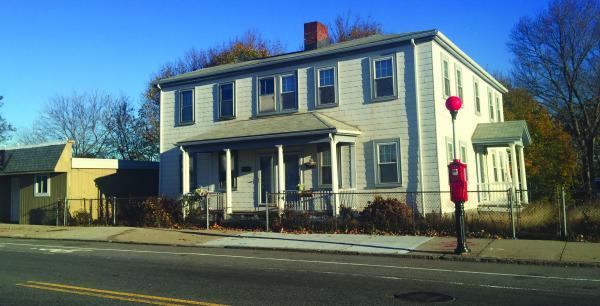November 18, 2015

A development firm plans to demolish this 2-family property at 364-366 Neponset Ave. to make way for 7, 3-bedroom townhouses. The proposal won variance permits from the Zoning Board of Appeals. Bill Forry photo
A proposed Neponset Avenue housing project won approval from Boston’s Zoning Board of Appeals last week despite strong opposition from abutters, a neighboring civic group, and an array of politicians.
The controversial project – the planned demolition of a two-family 1831 Federal style home at 364-366 Neponset Avenue to make way for seven three-bedroom townhouses situated near Garvey Playground – was supported by a representative of Mayor Martin Walsh’s office, which is now under pressure from civic leaders to explain why they approved the project over local objections.
The proposal, which is being managed by the David A. Bosworth Company Inc. of Braintree, received approval at the city’s ZBA meeting on Nov. 10 despite neighbors’ objections to the size and density of the project and assertions that it does not fit in with the neighborhood’s single-family and two-family homes. Residents have called the developers “un-neighborly” in their approach to the civic group’s review process.
According to the Pope’s Hill Neighborhood Association, the developers originally proposed the project at one of their meetings last spring as a development of eight townhouses, which association members strongly opposed. “We thought it was overcrowding. They were asking double the size what it was zoned for,” said John Schneiderman, president of the Pope’s Hill Neighborhood Association (PHNA).
He said the developers then missed two subsequent PHNA meetings, which the group was expecting them to attend as part of the negotiation process for development projects of this kind. But the group didn’t hear from the developers again until an abutters meeting on Sat., Nov. 7, where they announced they would lower the number of units to seven.
At last Tuesday’s zoning board meeting, representatives from the Pope’s Hill Association, from the offices of City Councillors Michelle Wu, Ayanna Pressley, Stephen Murphy, Charles Yancey, and Frank Baker, and from the offices of state Sen. Linda Dorcena Forry and state Rep. Daniel Hunt, all voiced opposition to the project. Meanwhile, David Cotter, the Mayor’s Office of Neighborhood Services’ Dorchester liaison, spoke for the city in favor of the project, which was then approved unanimously by the ZBA.
Later that day, the developers also had a demolition delay lifted at a Boston Landmarks Commission hearing (the property had previously been inventoried by the commission as part of a historic district).
Charles Bosworth, who attended the hearings as a representative of the David A. Bosworth Company Inc., said the proponents had submitted “over 100 letters of support from the community supporting the project.”
“We had a total of five meetings between abutters’ meetings and Pope’s Hill Neighborhood Association meetings. Unfortunately, not everyone is satisfied with the process, but I would say that five meetings is more than typically happens,” Bosworth said.
When the Reporter asked for further comment from the city, the city’s chief of civic engagement, Jerome Smith said via email that the developer had satisfied its requirements to respond to the concerns of the community.
“The city was pleased that the developer reduced the number of proposed units and presented letters of support from several members of the community and therefore supported the project moving forward,” Smith wrote.
Schneiderman said that the PHNA is concerned that this ZBA vote might set a precedent for how future developers deal with community groups as they move to win official approval. “I have no idea why it went through like that,” he said. “There was no negotiating there from what I understand.”
In a letter submitted to the mayor’s office on Nov. 15, longtime PHNA executive board member Robert Genduso pressed the Walsh administration to explain why they sided with the developer over the community in this instance. Genduso said that the key variance that drew local objections – one that restricts the density of units on the site – “would set a negative and dangerous precedent for future development proposals in the community.”
“It is understood from time to time that the city may feel the need to intervene in the name of the greater good,” Genduso wrote,”however, the greater good in this case was the existing community and not the developer. “There are several projects coming to the docket in the coming months, so understanding the city’s rationale for this decision will be important for us mapping future strategies and next steps.”
Genduso also noted that the civic association has hardly been anti-development. Last year, the Boston Redevelopment Authority approved a project that will result in a new 263-seat restaurant in the former Neponset Party Rental store building and 20 units of housing across the street.
Rep. Hunt said that development projects like this one face a confusing dual process in winning approval: They must present their proposal at community and civic group meetings and hold separate abutters meetings as required by the ZBA. But this process, according to Hunt, doesn’t necessarily yield enough information for the board to understand the impact a project might have on a neighborhood.
“The Zoning Board has a hard time extrapolating the various comments and signatures and local electeds’ perspectives on things versus what might be suitable in a certain square footage of property,” said Hunt. “But they struggle with knowing what is right and wrong for a certain neighborhood because they don’t have the ability to look at the various properties that are adjacent.”
For Schneiderman and the rest of the PHNA, this experience has been something of an awakening to how the city might approach development projects like this one going forward.
“I don’t understand why. There was no explanation for it,” Schneiderman said. “Evidently the zoning laws don’t matter. I thought that’s why they mattered – that’s why we have zoning laws.”
Villages:
Topics:


